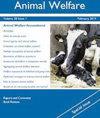A formal model for assessing the economic impact of animal welfare improvements at bovine and porcine slaughter
IF 2.3
4区 农林科学
Q2 VETERINARY SCIENCES
引用次数: 1
Abstract
The relationship between animal welfare at slaughter and slaughterhouse profitability is complex, with potential trade-offs between animal welfare costs and benefits. Slaughterhouses currently lack data support for decisions on investments that can improve both animal welfare and profitability. Therefore, this study mapped the economic impacts for slaughterhouse businesses of improved cattle and pig welfare at slaughter. Specific aims were to: (i) highlight the possible economic impact of animal welfare improvements, based on the scientific literature; (ii) develop an economic model demonstrating the theoretical contribution of animal welfare to slaughterhouse profitability; and (iii) validate the economic model through focus group interviews with slaughterhouse personnel in Sweden. The findings indicated that investing in animal welfare improvements could result in accumulation of an intangible asset that can be considered together with other production factors in the economic model. Model validation stressed the importance of selling by-products for the economic outcome and of smooth workflow for productivity. The study thus improves understanding of the economic impacts of animal welfare at slaughter and incentives for slaughterhouse businesses to improve animal welfare. The results are important for public and private policy-makers interested in enhancing animal welfare at slaughter.一个正式的模型,用于评估改善牛和猪屠宰动物福利的经济影响
屠宰场的动物福利和屠宰场盈利能力之间的关系是复杂的,在动物福利成本和收益之间存在潜在的权衡。屠宰场目前缺乏数据支持,无法做出既能改善动物福利又能提高盈利能力的投资决策。因此,本研究绘制了改善牛和猪的屠宰福利对屠宰场企业的经济影响。具体目标是:(i)根据科学文献,强调改善动物福利可能产生的经济影响;(ii)建立一个经济模型,证明动物福利对屠宰场盈利能力的理论贡献;(iii)通过对瑞典屠宰场人员的焦点小组访谈来验证经济模型。研究结果表明,投资于改善动物福利可能会导致无形资产的积累,这种无形资产可以与经济模型中的其他生产要素一起考虑。模型验证强调了销售副产品对经济结果的重要性,以及流畅的工作流程对生产力的重要性。因此,这项研究提高了对屠宰场动物福利的经济影响的理解,以及屠宰场企业改善动物福利的激励措施。研究结果对有意提高屠宰动物福利的公共和私人决策者具有重要意义。
本文章由计算机程序翻译,如有差异,请以英文原文为准。
求助全文
约1分钟内获得全文
求助全文
来源期刊

Animal Welfare
农林科学-动物学
CiteScore
2.30
自引率
8.30%
发文量
43
审稿时长
18-36 weeks
期刊介绍:
Animal Welfare is an international scientific and technical journal. It publishes the results of peer-reviewed scientific research, technical studies and reviews relating to the welfare of kept animals (eg on farms, in laboratories, zoos and as companions) and of those in the wild whose welfare is compromised by human activities. Papers on related ethical, social, and legal issues and interdisciplinary papers will also be considered for publication. Studies that are derivative or which replicate existing publications will only be considered if they are adequately justified.
Papers will only be considered if they bring new knowledge (for research papers), new perspectives (for reviews) or develop new techniques. Papers must have the potential to improve animal welfare, and the way in which they achieve this, or are likely to do so, must be clearly specified in the section on Animal welfare implications.
 求助内容:
求助内容: 应助结果提醒方式:
应助结果提醒方式:


